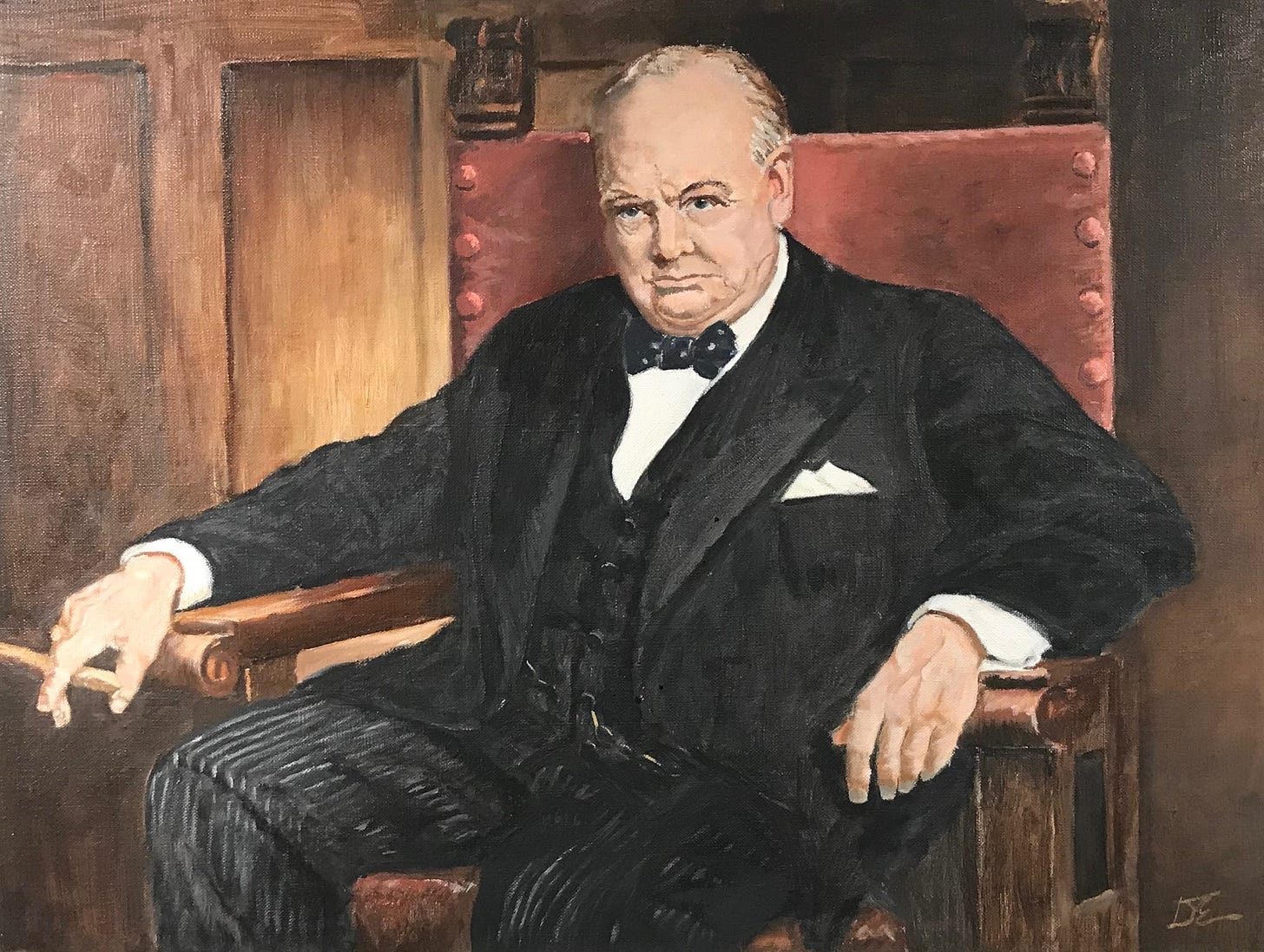I am reading a new biography of Winston Churchill by Andrew Roberts, Churchill: Walking with Destiny. One of the most important things about Churchill was that he knew he was “walking with destiny,” knew he was doing—-or about to do—-vitally important things.
Roberts doesn’t gloss over Churchill’s many failures, but does address them in the context of how they shaped his later life, indeed, how, in many cases, his failures specifically made some of his career leaps possible. “If there were ideal conditions for the creation of a future hero of the Empire, by the end of January 1895 Churchill had fulfilled all of them. A famous name, selfish and unimpressed parents, a patchy but patriotic schooling that taught him how great men can change history by great feats, a first-class military education. . . not enough money to become indolent, appreciation of English prose and a reverence for the British history that he felt ran through his aristocratic veins.”
Churchill’s father died at just the right time, for had he lived much longer he would have been awarded a peerage that would have befallen Winston—-to the defunct and largely irrelevant House of Lords rather than the House of Commons, where he had a miniscule chance, at the time, of becoming Prime Minister. Churchill married his military service with his writing skills: the former sent him right into the midst of combat, where he could entertain readers with his columns and make enough money on the side to survive.
As did Abraham Lincoln, Churchill studied the spoken and written word. He learned to write tersely, to speak with clever devices, to study his father’s speeches. He found that cadences and phrases were extremely important and practiced putting in the “pregnant pause” before making a point. Above all, he demanded precision of words, writing out almost all of his most important speeches. And he also knew that an emotional connection with his audience was critical. It is astonishing how many of his great World War II speeches contain the “five elements” of a good speech that he elaborated early in his career.
Sir Winston did not lack courage, fighting (actually fighting, not holding an Al Gore semi-combat position) in four wars while publishing three books. Like modern day liberals, Churchill failed on some positions and was promoted upward, from Home Secretary to the First Lord of the Admiralty where he suffered perhaps his greatest setback, his plan to open a second front at Gallipoli. He had eerie prescience at times, writing in 1911 of the method, location, and timing of the German offensive against France in 1914. The Dardanelles campaign was a desperate attempt to stop doing the same stupid thing—-mass frontal attacks on trenches—-and expecting a different result. It failed for a number of reasons, some of them directly laid at Churchill’s feet. When he was fired, he immediately joined the Army in France. (Imagine ANY politician today with such integrity or courage). Meanwhile he had basically invented the tank, which would come too late for the trenches of the Great War, but would ensure that in the next war such fortifications were useless.
Churchill was a man of paradoxes. He was one of the first to appreciate the combat power of airplanes and insisted on a British buildup, but when World War II broke out, he was slow to see how critical they were against ships. His Norway campaign might have worked, but typically the British government moved too slow and it, too, failed. In many ways he resembled Donald Trump: many in the British government desperately wanted change, but none wanted Churchill to be the beneficiary.
From 1931 to 1933 he almost alone saw the growing clouds of Nazism as a threat to England. He, almost alone, understood Hitler as an earlier version of the radical communist students of the 1960s. As Abbie Hoffman would say, “meet one of our demands and we’ll have ten more.” He predicted Irish neutrality in World War II, to the ‘looks of incredulity, the mockery, derision, and laughter” from the House.
As a former fighting military man—-not a lawyer or bureaucrat—-Churchill could immediately calculate the combat value of machinery, knowing that if Britain handed over the Sudetenland in Czechoslovakia, that the entirety of Czechoslovakia and its noted Skoda military works would add hundreds of tanks to Hitler’s arsenal overnight. Which it did.
Possibly his greatest decision was a non-decision. After the evacuation at Dunkirk—-a remarkable achievement, but, after all, an evacuation—-there was still a faint hope that the French might fight. In an attempt to bolster their sinking morale, Britain sent two divisions back to France to try to link up with regrouping French units (which there were none of). To that point, France had deceptively refused to say it would surrender (despite having come to that conclusion). Churchill could send a third division, putting over 130,000 British troops in position to support the French . . . or he could withdraw them all. Against tremendous pressure to stay and against his own inclinations to fight, Churchill withdrew the soldiers in time to save them. The French surrendered anyway.
Winston Churchill made enough mistakes for a lifetime. But his successes towered over his defeats, and his ability to single-handedly rally England for the fight of its life obscured and even erased many of his earlier errors. He indeed “walked with destiny.”
Larry Schweikart, rock drummer, film maker, YTimes #1 bestselling author
Help me make “A Patriot’s History of the United States” video series. Please watch the trailer, then if you like it “Buy Larry a Coffee”—-all proceeds go to the film series.
http://buymeacoffee.com/larrys



